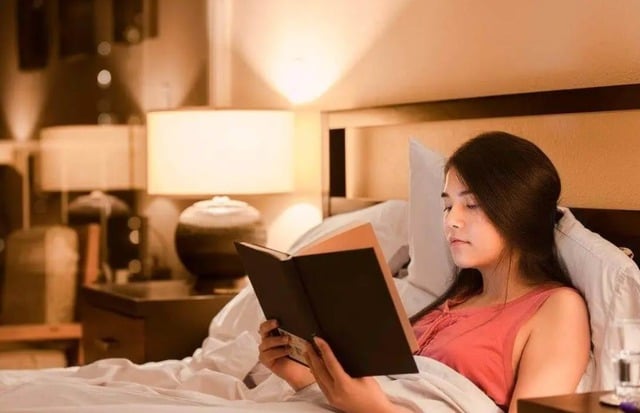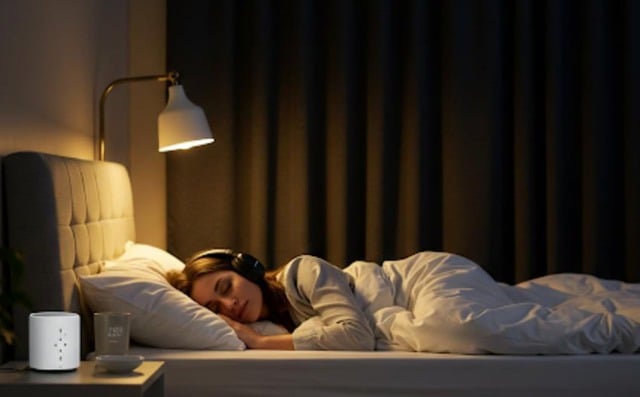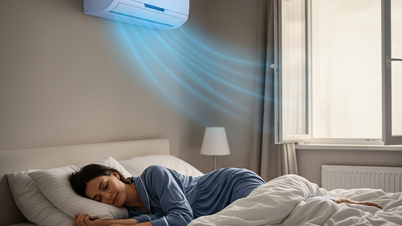Before closing your eyes, take a moment for yourself: turn off your phone, read a book, take deep breaths or meditate. This habit helps your brain relax, improving your sleep and your mood the next day. Applying it regularly, you will see a clear difference in the quality of your sleep and your mental state.
Free up your screen to restore your sleep and mind
When notifications don’t stop, phone screens stay lit in the dark, and we scroll through social media before we close our eyes to sleep, it’s not just a habit, it can be a silent “night-breaker.” Multiple studies have shown that using a screen in the hours before bed is associated with shorter sleep times, poorer sleep quality, and an increased risk of insomnia. Therefore, prioritizing “screen-free time” of at least 30 minutes before bed, or better yet, 60 minutes, is being recommended by mental health and sleep experts as an important part of mental health care.

Relaxing in bed with a paper book in hand and your phone far away is a symbol of mental detox before sleep.
The obvious harms of using screens before bed
Phone, tablet, and TV screens emit blue light—the kind that interferes with the hormone melatonin, which is released at night to help your body prepare for sleep. When this light is suppressed, it delays your ability to fall asleep, disrupting your nighttime sleep and recovery. Studies show that people who use screens before bed tend to have longer and less quality sleep.
Not only light, but exposure to social media, email, and news right before bed keeps your brain active — making it harder to shut off. The constant stream of images, videos , and notifications can easily make you worry, compare, or wake you up in the middle of the night. A study of 45,000 adults found that each hour of screen time before bed increased your risk of insomnia by 59% and reduced your sleep by nearly 24 minutes per night.
Constantly "priming the screen" before bed creates a cycle: wakefulness, stimulation, difficulty sleeping → less sleep → fatigue → using the screen for "nighttime entertainment" → long-term effects on cognitive function, mood and mental health.
Establish a "no screen" routine before bed
Pick a set time each night, say 9 p.m. or 30 minutes before bedtime, to turn off or put your phone on “do not disturb” mode. Some experts recommend even 60 minutes before bed to allow your brain to fully unwind.
Instead of scrolling, you can:
- Read a paper book or listen to a light audiobook.
- Take deep breaths and meditate mindfully for 5-10 minutes.
- Take a warm bath or shower to signal your body that it's time to rest.
- Write a quick journal entry of a few things you're grateful for during the day.
- Keep your phone out of the bedroom or out of reach.
- Turn off notifications and lights from devices in the bedroom.
- Keep your bedroom dark, cool, and quiet to help your body transition into its natural sleep state.
If you have trouble completely eliminating screens before bed, start with 30 minutes and gradually work your way up to 60 minutes. Stick with it for a few weeks and you should see noticeable improvements: falling asleep easier, sleeping more deeply, and waking up less tired.
Pay attention: If you have trouble falling asleep, wake up in the middle of the night, or feel your brain "whirlwind" when adjusting lights and screens, it's a sign that you need to prioritize this habit. Experts say that early recognition and immediate changes can help avoid long-term effects on your mental and physical health.

Soft lighting in the bedroom, without electronic screens, helps the brain relax and prepare for deeper sleep.
Benefits of adopting habits
- Sleep faster and deeper, helping the brain recover better at night.
- Improved mood, less anxiety and reduced feelings of stress.
- Increase concentration, reduce "brain fog" the next day
- Maintains a healthy biological clock, supports overall health and prevents certain chronic diseases.
An information and screen detox isn't just "good living" advice, it's a plan to protect your mind and sleep. In just 30-60 minutes each evening, you're giving yourself the quiet time you need to free your body and mind from "digital noise." By setting clear boundaries, choosing alternative activities, and listening to your body, you'll improve your sleep, your mind, and your overall health.
Source: https://suckhoedoisong.vn/ngu-ngon-hon-nho-30-phut-khong-man-hinh-moi-toi-169251109110621594.htm



![[Photo] Prime Minister Pham Minh Chinh attends the annual Vietnam Business Forum](https://vphoto.vietnam.vn/thumb/1200x675/vietnam/resource/IMAGE/2025/11/10/1762780307172_dsc-1710-jpg.webp)

![[Photo] Prime Minister Pham Minh Chinh attends the Patriotic Emulation Congress of the Ministry of Foreign Affairs for the 2025-2030 period](https://vphoto.vietnam.vn/thumb/1200x675/vietnam/resource/IMAGE/2025/11/10/1762762603245_dsc-1428-jpg.webp)






















































































![Dong Nai OCOP transition: [Article 3] Linking tourism with OCOP product consumption](https://vphoto.vietnam.vn/thumb/402x226/vietnam/resource/IMAGE/2025/11/10/1762739199309_1324-2740-7_n-162543_981.jpeg)











Comment (0)